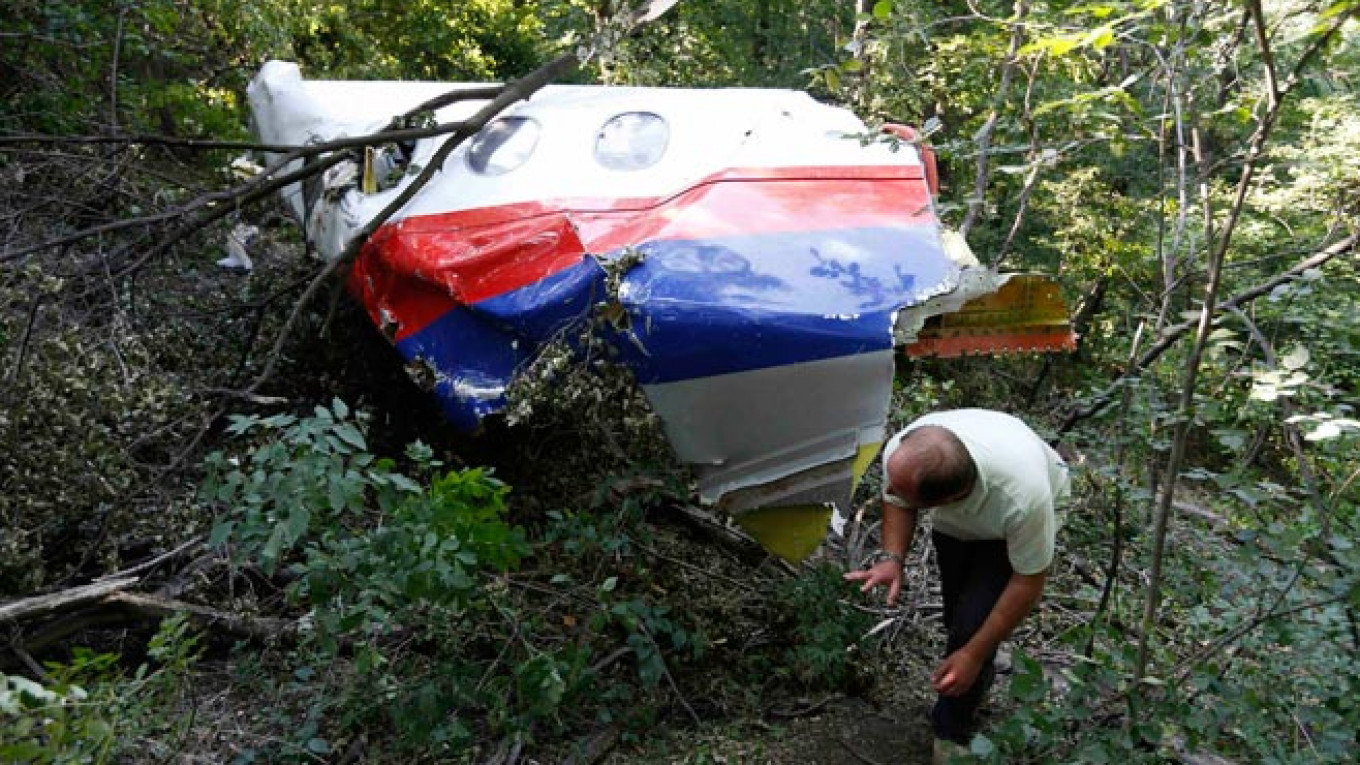Eighty-two percent of Russians believe the Ukrainian army is to blame for the downing of Malaysia Airlines Flight MH17, a poll released Wednesday by the independent Levada Center showed, as the investigation into the tragedy suffered yet another setback Wednesday.
A mere 3 percent of respondents to the poll bought into the Western version of events and pinned the blame for the July 17 disaster — in which nearly 300 people were killed — on pro-Russian separatists in eastern Ukraine. The overwhelming majority echoed the Russian government's official line and pointed the finger at the Ukrainian military.
One percent of respondents cited pilot error, and another 1 percent technical malfunction. Two percent said they believed a bomb had exploded on board the plane, and another 16 percent expressed difficulty in answering the question.
The poll, conducted from July 18 to 24 among 1,501 adults in six major cities, reflects the polarizing effect the tragedy has had on Russia and the West. Its publication follows on the heels of another round of sanctions by the U.S. and the European Union over what they say is Russia's aggressive policies in Ukraine, where more than 1,000 people have been killed since mid-April as pro-Russian separatists battle Ukrainian troops.
More than 10 days after the downing of the passenger plane shocked the world and thrust what had previously been a mostly domestic conflict in Ukraine into the international arena, there are more questions than answers regarding who is responsible for the loss of 298 lives.
Observers from the Organization for Security and Cooperation in Europe headed back to the nearby city of Donetsk on Wednesday after a failed attempt to access the wreckage site. Pro-Russian separatists in the area had refused to let them through over safety concerns amid ongoing fighting in the area, the Associated Press reported.
Ukrainian security official Andriy Lysenko said at a news briefing Wednesday that the rebels had "mined the approaches to this area [the crash site]. This makes the work of international experts impossible."
Data retrieval from the flight's black boxes currently being conducted by experts in Britain is also unlikely to provide a full picture of events, Kommersant said Wednesday, citing Russian aviation experts as saying the analysis would only offer indirect evidence.
Both the U.S. and Kiev have claimed to have proof not only of the separatists' involvement, but also evidence that they have received weapons and training from Russia. Kiev released audio clips purporting to be rebel leaders reacting to the news that they had shot down a passenger plane on the day of the tragedy, and the Pentagon has published satellite photos of what it says is a training facility in Russia's Rostov region where the rebels learned to use the missile system believed to have taken down the Boeing 777.
Moscow has poured cold water on all these accusations, saying the West has jumped to conclusions and offered no irrefutable proof.
The Kremlin's response to the disaster has firmly and consistently placed all responsibility on the new government in Kiev and the Ukrainian military. President Vladimir Putin's first comments in the wake of the catastrophe criticized the Ukrainian government for not keeping its air space secure.
The Defense Ministry followed suit, holding a news conference four days after the incident at which officials presented what they said was evidence of Ukraine's involvement. They offered diagrams purporting to show a Ukrainian fighter jet flying near the doomed passenger plane just before it was shot down.
In their description of the separatists who have been referred to as terrorists in the West, officials from the Foreign Ministry portray the Ukrainian authorities as fascists and the rebels as ordinary men forced to protect their own.
On Tuesday, the ministry's official spokesman, Alexander Lukashevich, issued a statement defending the separatists as members of the local population who "took up arms to protect themselves and their families from ultra-nationalists and neo-Nazis."
Russia's state-run media — which holds a firm grip over the country's television stations and dominates the media landscape — has mostly parroted such official statements on the matter.
Two of the biggest television channels, Channel One and Rossia-24, often describe the Ukrainian troops as "punishers" in their reporting and base reports on the testimony of separatists.
The Levada Center's poll had a margin of error that did not exceed 4 percent.
See also:
UN Plans Airline-Safety Unit After MH17 Plane Crash in Ukraine
A Message from The Moscow Times:
Dear readers,
We are facing unprecedented challenges. Russia's Prosecutor General's Office has designated The Moscow Times as an "undesirable" organization, criminalizing our work and putting our staff at risk of prosecution. This follows our earlier unjust labeling as a "foreign agent."
These actions are direct attempts to silence independent journalism in Russia. The authorities claim our work "discredits the decisions of the Russian leadership." We see things differently: we strive to provide accurate, unbiased reporting on Russia.
We, the journalists of The Moscow Times, refuse to be silenced. But to continue our work, we need your help.
Your support, no matter how small, makes a world of difference. If you can, please support us monthly starting from just $2. It's quick to set up, and every contribution makes a significant impact.
By supporting The Moscow Times, you're defending open, independent journalism in the face of repression. Thank you for standing with us.
Remind me later.






